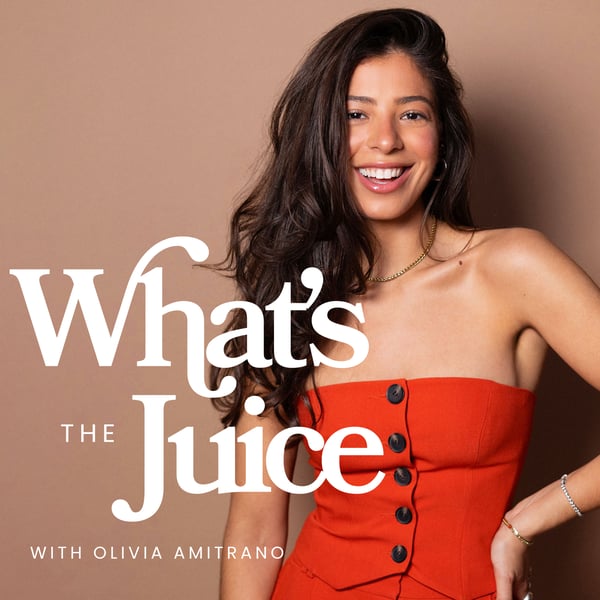THE SECRET SCIENCE OF BRAIN HEALTH - myths about Alzheimer’s, foods for cognitive health & insulin resistance with Max Lugavere
What's The Juice
Olivia Amitrano
4.9 • 2.1K Ratings
🗓️ 28 August 2023
⏱️ 76 minutes
🧾️ Download transcript
Summary
Ep 85. This week I have the pleasure of sitting down with science journalist and a New York Times bestselling author, Max Lugavere. This is an episode all about nutrition science and brain health and we focus on using food as a tool to protect your brain and prevent cognitive decline. Max and I share the unfortunate experience of having a mother who is suffering or has suffered from Alzheimer's disease and that is what we've dedicated this episode to today. We’re deeply passionate about the current research around Alzheimer's disease and we want to empower individuals to use diet and lifestyle modification to slow this terrible illness.
Here's the juice:
-
consider this your crash course in nutrition science with a major focus on brain health
-
the root causes of Alzheimer's disease and the most common misconceptions
-
how does Alzheimer’s develop and who is at the highest risk
-
why amyloid plaque may not be the root cause, even though it’s been the dominating hypothesis
-
the role genetics play and how epigenetics can actually turn off diseases
-
therapeutic avenues you can take if you notice symptoms of cognitive decline
-
how a ketogenic diet can help the brain switch its energy source
-
why you should be eating Brazil nuts daily!
-
a fresh take on meat and saturated fat and why butter may not be the “health food” so many folks make it out to be
-
the link between insulin resistance and Alzheimer's disease
Links from the ep:
- visit https://www.veri.co/ and use code VSM-ORGANICOLIVIA for $30 off your own CGM
Connect with Max:
Follow HERE
Listen HERE
Connect with Olivia:
Transcript
Click on a timestamp to play from that location
| 0:00.0 | Welcome back to What's the Juice podcast. Today I have a very special guest for you guys, Max Lugabeer. I'm sure that many of you are familiar with his work because he is a science journalist and a New York Times bestselling author, the author of Genius Foods, a book about how you can utilize medicinal foods, food as medicine to protect your brain and hopefully slow or prevent |
| 0:23.5 | cognitive decline, a topic that is very close to our hearts. Unfortunately, Max and I both know |
| 0:30.4 | all too well the unfortunate experience of having a mother who is suffering or has suffered |
| 0:36.1 | from Alzheimer's disease. And that is what we've dedicated |
| 0:39.4 | this episode to today because we are both extremely passionate about the current research |
| 0:45.7 | around Alzheimer's disease and all of the things that we're now discovering we can do as |
| 0:49.6 | individuals when it comes to diet and lifestyle to hopefully prevent or slow this terrible illness. |
| 0:55.9 | This is an episode all about nutrition science and brain health. And Max and I are going to |
| 1:01.8 | have a huge conversation about the root causes of Alzheimer's disease and most importantly |
| 1:07.8 | the misconceptions that we've had about Alzheimer's for so long in the science |
| 1:13.5 | world. So we get right to the root of it. Max is going to explain to us what Alzheimer's disease |
| 1:18.7 | actually is, how it develops, how many people are suffering from it, and who is at the highest risk. |
| 1:25.0 | And he's going to explain to us why amyloid plaque is not actually the root |
| 1:29.0 | cause of Alzheimer's disease, even though that's been the dominating hypothesis and the target |
| 1:34.1 | of drug development for many years now. He's going to explain how amyloid plaque is something that |
| 1:39.4 | appears in the brain in some, not all people with Alzheimer's disease and how it's more so a phenomenon |
| 1:46.0 | that's happening in the face of the disease rather than the actual root cause of the disease. |
| 1:51.0 | He's also going to talk about the findings that he has unearthed after many hours and years |
| 1:55.9 | that he spent researching and writing about this disease and different therapeutic avenues that you can take |
| 2:02.7 | once you already have symptoms of cognitive decline, such as a ketogenic diet and how that can |
| 2:07.7 | essentially be used as a band-aid, but a very helpful band-aid when it comes to helping the brain |
| 2:12.9 | switch its energy source to something that it can use to stay healthier for a longer |
... |
Please login to see the full transcript.
Disclaimer: The podcast and artwork embedded on this page are from Olivia Amitrano, and are the property of its owner and not affiliated with or endorsed by Tapesearch.
Generated transcripts are the property of Olivia Amitrano and are distributed freely under the Fair Use doctrine. Transcripts generated by Tapesearch are not guaranteed to be accurate.
Copyright © Tapesearch 2025.

